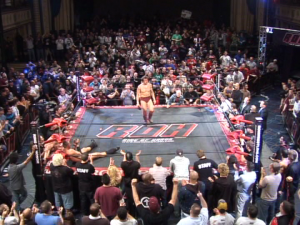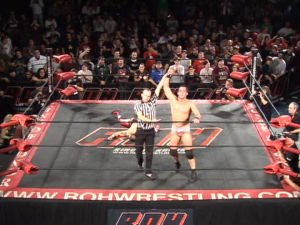Ring of Honor – three words that became synonymous with the independent wrestling boom of the early to mid 2000s that saw the rise of not only future wrestling superstars, but also the changing of pro wrestling’s very in-ring dynamic presentation. Using monthly issues of “Pro Wrestling Illustrated”, various websites usually connected to angelfire.com, and the trading of VHS tapes, I became familiar with names such as “Reckless Youth”, “The Fallen Angel”, Cheetah Master, and Trent Acid just to name a few.
Ring of Honor was meant to be a true showcase for all the budding or solidified indie wrestling talent. Instead, ROH turned into one of the premiere wrestling organizations in North America by capitalizing on the fall of wrestling’s “Attitude Era” with a product more similar to mixed martial arts than Extreme Championship Wrestling. Being a fan of ROH since its inception in February 2002, I’ve witnessed a majority of the company’s moments both significant and less-so live or through video. And just like any wrestling promotion, there have been decisions made and circumstances play out leaving this ROHbot wondering, “What if…?”
Today I ask: “What if ‘Glory By Honor VIII’ was ROH’s last event?”
What Really Happened?
2009 was a rough time for Ring of Honor. After attaining unbelievable popularity amongst hardcore wrestling fans, ROH’s wrestlers earned a level of attention from bigger companies offering a lot more money to sign with the likes of WWE, Total Nonstop Action/TNA and even Japan-only promotions like Pro Wrestling NOAH and New Japan Pro Wrestling. This resulted in top stars like Samoa Joe, CM Punk, Homicide, Low Ki, and Christopher Daniels leaving for “greener pastures” without ROH having the chance to properly elevate new talent to replace them. ROH also suffered from managerial shifts during the tail-end of 2008 as head booker & the man many stated was responsible for the magic of ROH during its formative years was relieved of his duties.
Gabe Sapolsky – a protege of Paul Heyman – was around ROH since day one; becoming the recognized force behind all ROH’s greatest moments. With Gabe gone, former NWA World’s champion and then-ROH wrestler Adam Pearce took control of the booking; making decisions both critically panned and universally praised such as Tyler Black’s ROH World title chase in regards to the prior and the handling of ROH’s Tag Team division in relation to the latter.
By the summer of 2009, the last wrestlers synonymous with ROH’s greatest time thus far were Bryan Danielson and Nigel McGuinness. Both former ROH World champions, Danielson and McGuinness bridged the gap between the eras and seemed to be those grizzled, young veterans ready to step aside so they could help groom the rising crop of talent like Black, Kenny Omega, and The American Wolves. Heading into ROH’s annual “Glory By Honor” event, it was announced Danielson and McGuinness had contract offers from WWE.
While Danielson was able to enter WWE’s roster, McGuinness’ body didn’t allow for him to pass the necessary physicals and he opted to take another lucrative contract offered by TNA. ROH was left with only one option: give the fans Danielson versus McGuinness one last time. But little did the fans know that the owner of ROH at that time Cary Silkin saw Danielson & McGuinness leaving as more than just the end of an era – he saw it as the end. According to Silkin in interviews & podcasts many years later, he actually played around with the idea of closing ROH after “Glory By Honor VIII” as the loss of his last two homegrown stars seemed impossible to recover from; a possibility even more believable thanks to ROH not financially growing and proving a money loss for everyone involved. After years of trying to breakthrough to that next level, talent loss and the scope of pro wrestling changing, this may have been the wisest time for Cary Silkin to close the doors of Honor.
What if…?
Dubbed “The Final Countdown Tour”, ROH’s three shows leading up to “Glory By Honor VIII” were a celebration of Bryan Danielson’s final days in ROH while he faced up & coming talent with the intent of establishing them as the men to beat after his exit. Chris Hero, Davey Richards and ROH World champion Austin Aries all bested Danielson in his matches heading into his final clash with Nigel McGuinness. McGuinness too lost in his pre-“GBH” encounter against Roderick Strong; another person pegged as a future ROH World champion if ROH management ever decided to pull the figurative trigger. With the knowledge of ROH closing its doors at “GBH VIII”, ROH could easily promote this monumental event as a must-see show beyond Danielson vs. McGuinness one last time; giving “The Final Countdown” moniker more meaning than just an homage to Bryan Danielson and his usage of Europe’s “The Final Countdown” as his entrance theme song.
With the roster available, the card and its results stay mostly the same (including Danielson overcoming McGuinness in the night’s main event) with a few alterations including to the much-anticipated Ladder War II Tag Team Championship match between defending champions The American Wolves and challengers Kevin Steen & El Generico. Eddie Edwards of The Wolves fractured his right elbow the night prior and convinced doctors that the injury was just a storyline/work to add drama to the match. Visibly unable to move his right arm and in tremendous pain, Edwards gutted through the match that, eventually, he won after stopping Generico from ascending the ladder while Eddie’s partner Davey Richards retrieved the belts. With this being the last feel-good opportunity for ROH’s Tag Team Championship, Steenerico would instead regain the gold they lost months prior.
The Briscoes will go down in history as the greatest tag team in ROH history, but in New York that night it was Matt & Nick Jackson showcasing their superiority as The Young Bucks overcame Jay & Mark Briscoe. It was a stunning upset and established The Bucks as a team on the rise. Considering this being the last ROH show it would only make sense The Briscoes win instead. ROH World champion Austin Aries found himself squaring off with TNA’s Petey Williams during the actual event. On paper, Aries versus Williams seemed like a marvelous match. In reality, the end result was a solid encounter marred by the fact the match ended in a count-out. Considering Roderick Strong defeated McGuinness one show prior, having a bout featuring the former ROH World Tag Team champions fighting for the ROH World title would’ve been optimal with Strong finally winning the ROH World Championship. Petey could easily be added to the Four Corner Survival match that Roderick won in real life involving Delirious, Grizzly Redwood and Sonjay Dutt. It would’ve been bitter sweet, but the best of a sad situation if there ever was one involving ROH in 2009.
Remain or Change?
The obvious answer is it was better for the wrestling business as a whole that ROH continued to exist past “Glory By Honor VIII”. After what could only be considered a low point of a year in 2009, ROH rebounded in 2010 mostly thanks to the stellar storyline featuring Kevin Steen fighting El Generico. 2011 saw Sinclair Broadcast Group purchase ROH; giving it a syndicated TV show and financial opportunities not seen for the company & its wrestlers in the nine years the company had existed up to that point. ROH’s continued survival gave validation to not only a slew of wrestlers who would go on to revolutionize the business in the following years, but also set the stage for New Japan’s US invasion and the birth of AEW.
On a smaller scale, though, ROH ending its time prematurely may have been to the benefit of companies like Pro Wrestling Guerrilla and CHIKARA as they gained a surge in popularity in 2010 as well; utilizing talent both contracted to ROH and actually being a gateway for future ROH stars like Dalton Castle, Marty Scurll and Jeff Cobb. Gabe Sapolsky’s EVOLVE promotion may have found a greater audience a lot sooner while becoming an official developmental territory for WWE similar to Ohio Valley Wrestling. For companies like WWE and New Japan, without ROH’s roster to help establish the prior’s NXT brand and the latter’s various tournaments & title divisions including the Jr. Heavyweight and NEVER Openweight Championships these brands and championships respectively would’ve either stagnated or even failed. Though ROH’s time as indie wrestling’s top promotion coming to an end may have benefited smaller companies short-term, it’s hard to believe a ROH-less wrestling business coming into 2010 and beyond would have helped pro wrestling become what it is today.








